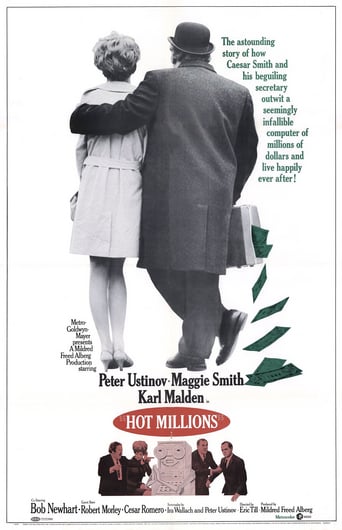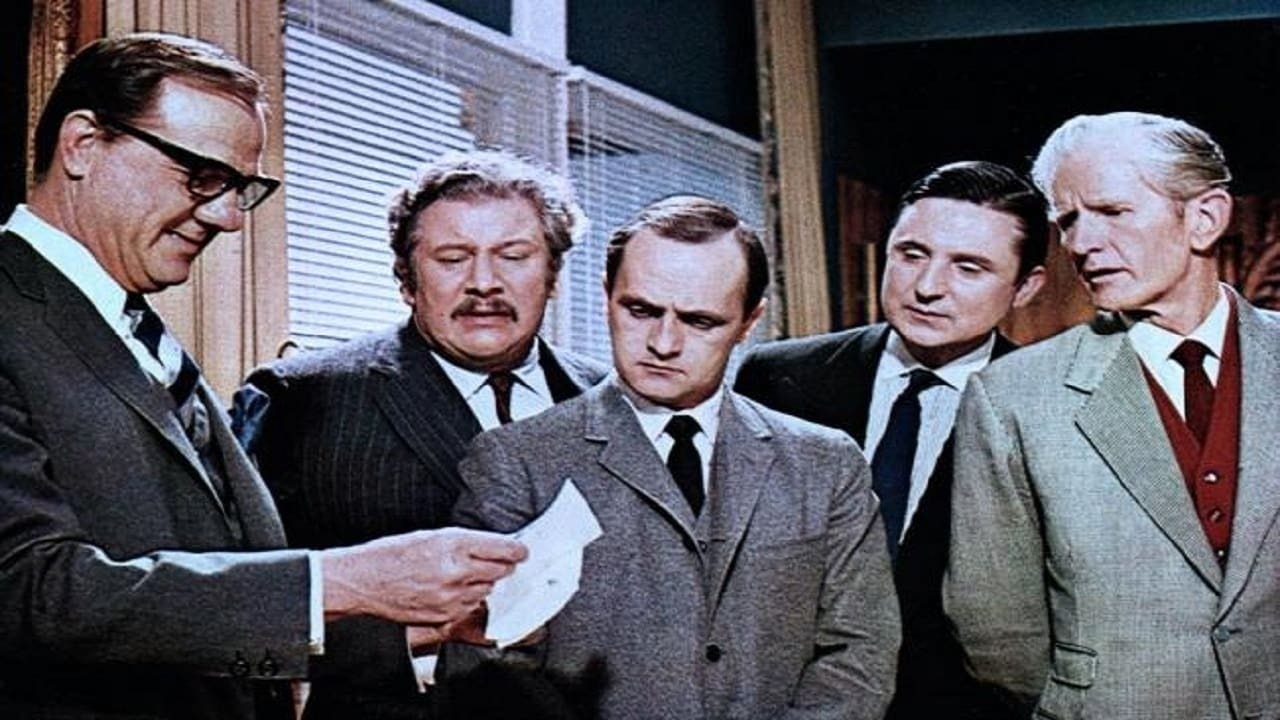jacobs-greenwood
Directed by Eric Till, with a story & screenplay written directly for the screen that earned Ira Wallach and lead actor Peter Ustinov their only Writing Academy Award nominations, this dated comedy has an ironic conclusion. Fans of Ustinov's characterizations, complete with fumbling mannerisms intended to make one wonder if he (e.g. his character) is bumbling idiot or a genius pretending to be one, will certainly enjoy it while others may find that they wear thin to the point of being tiresome, especially during this film's slow moving plot. Plus, Bob Newhart's comedic capabilities are wasted in his role.Ustinov plays Marcus Pendleton who, upon his release from jail (presumably for a "white collar" crime) where he did the warden's taxes, steals the identity of (wannabe moth explorer &) computer expert Caesar Smith (Robert Morley) to get a job in the I/T (information technology) department at Ta Can Co, a concrete & cement corporation. He's hired by Tacanco's executive vice president Carlton Klemper (Karl Malden); Newhart plays VP Willard Gnatpole. Maggie Smith plays Patty Terwilliger who, with seemingly no skills, can't keep a job until she's hired as a Tacanco secretary that's assigned to work for Smith. She knows him as Pendleton, because he lives in the same apartment building, but is otherwise clueless that her boss is about to embark on an elaborate embezzlement scheme. Cesar Romero appears late in the story as a customs inspector (in two scenes which seem unnecessary).It's the 1960's, so the executives we see in the London offices of this American conglomerate are on the make (e.g. out for sex) AND are apparently able to kick up their feet & look out their office windows in lieu of doing any real work. By throwing around a few acronyms here & there and hiring an outside consultant to write some management recommendations for him, Ustinov as Smith has Klemper completely fooled as to his competency whereas Gnatpole is suspicious. Both, however, are impressed by what they think is their new hire's sexual prowess. Since he keeps unqualified secretary Patty employed, they assume she's meeting his "other" needs. Gnatpole's attraction to Patty keeps him off balance and his suspicions somewhat at bay. Meanwhile, accountant trained but computer novice Pendleton/Smith reads a few technical manuals and, after learning an important trick from a housekeeper, is able to figure out how to defeat the corporation's computer security in order to drain one million pounds from the company's 290 million dollars in assets over the course of his year's employment. He does this by establishing dummy companies around the European continent; when the computer prints its checks, one goes to each of them.The plot bogs down, necessarily as it turns out, when Patty is fired by personnel for being late. She and her former boss & neighbor Pendleton then discover that they're both lonely, and begin a relationship that leads to marriage and even her pregnancy. Eventually, of course, the crime is uncovered and Patty learns the truth about her husband and their sudden need to flee the country for Rio de Janeiro, but this comedy's payoff is when the truth about Patty is discovered.
moonspinner55
Co-writer and leading actor Peter Ustinov has never been more ingratiating and wily (and handsome) than he is here playing a paroled ex-con who is an expert with numbers; he studies up on the burgeoning computers field and gets a job with a firm that, once he cracks the main code, will allow him to embezzle his way into a million pounds. Although the plot set-up is both cheeky and creaky (partly because we've been in this territory before), Ustinov's nonchalant genius parlays itself into a wonderful character; never depraved or insulting, he seems to catch himself off-guard with his successes, of which each is followed by another in the actor's repertoire of funny faces. The direction is hectic and perfunctory, and the editing is nervous, but there are some lovely scenes such as when Ustinov is invited up to ex-secretary Maggie Smith's flat and begins playing beautiful piano (she reciprocates with a duetting flute in the picture's finest moment). Once the mechanisms of the story have unfolded, there isn't much point going on, though the film has several more scenes which are upbeat but unessential. As Ustinov's boss, Karl Malden modulates (somewhat) his irascible nature, but Bob Newhart's nerdy associate is the proverbial egghead and schnook. Smith's Cockney working girl is fun until she marries Ustinov, which is just about the time the movie starts darting about, looking for a finish line. **1/2 from ****
blanche-2
Talk about a dream cast - just two of the most wonderful actors who ever appeared anywhere - Peter Ustinov and Maggie Smith - together - in "Hot Millions," a funny, quirky comedy also starring Karl Malden, Robert Morley, and Bob Newhart. Ustinov is an ex-con embezzler who gets the resume of a talented computer programmer (Morley) and takes a position in a firm run by Malden - with the goal of embezzlement in mind. It's not smooth sailing; he has attracted the attention of his competitor at the company, played by Newhart, and his neighbor, Maggie Smith (who knows him at their place of residence under another name), becomes his secretary for a brief period. She can't keep a job and she is seen throughout the film in a variety of employment - all ending with her being fired. When Newhart makes advances to her, she invites Ustinov over to her flat for curry as a cover-up, but the two soon decide they're made for each other. Of course, she doesn't know Ustinov is a crook.This is such a good movie - you can't help but love Ustinov and Smith and be fascinated by Ustinov's machinations, his genius, and the ways he slithers out of trouble. But there's a twist ending that will show you who really has the brains. Don't miss this movie, set in '60s London. It's worth if it only to hear Maggie Smith whine, "I've been sacked."
Chris Davis
I can only echo the praise of the other reviews here. It's a delightful film with a feelgood factor that it achieves without crossing the line into soppy sentimentality. Naturally sweet - no added sugar.One small point: it seems to me that the mild objections raised about Ustinov's character Pendelton being able to walk in and defeat the system security ignore the fact that Pendelton is clearly a genius/savant at this sort of thing. Yes, the film was pretty computer illiterate, but it did show Pendelton 'studying computers' at his flat, and I believe the implication was supposed to be that his gifts allowed him to simply engulf the whole subject, practically overnight.There were a few odd moments when it appeared in some scenes that Gnatpole was trying to test Pendelton's knowledge and call his bluff. I'm not sure whether we were supposed to believe that Pendelton cunningly weaselled his way out of these situations, or whether he was actually knowledgeable enough to pass the tests - it was a little unclear.Certainly he had to know enough to set up the dummy accounts. Presumably Wallach and Ustinov were relying on their own rather foggy notion of how computers worked in those days, and in order to understand in detail what they were getting at, it's necessary to know quite what their concept was. They knew there was something about 'procedures' which was important; they thought that the 'smart light' could actually control security, rather than just indicate its state; they thought that the (dumb) user terminal's features would strongly influence what could be done on the mainframe itself - though apart from things like graphics feature I don't see it meself.Mostly, I think they tried to avoid the subject of actual computer operations as far as they could, and they did that rather well. Allowing them a bit of artistic license, I don't think their efforts had any flaws worthy of note.CD


 AD
AD


